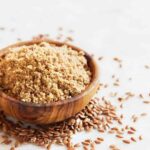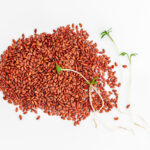And the Oxalate Controversy Rages On …
We got lots of interesting email in response to my rebuttal to the wildly exaggerated and completely undocumented article posted by one “Sarah, the Healthy Home Economist” that tells people not to drink green smoothies and says they can “devastate” your health.
Heidi, a “low oxalate” blogger / site owner wrote a response. I like to look at all viewpoints and appreciate that she listed lower-oxalate greens for those who wish to concern themselves with this issue. She has eliminated some health problems by carefully reducing oxalates for 20 years. Those include turnip and mustard greens, dino kale, curly kale, romaine, cabbage, and collards.
Hopefully Heidi has been creative to keep lots of greens and raw roods in her diet while controlling for oxalates. If not, we eliminate one compound causing a problem and dozens of other compounds desperately needed and hard to find in other sources.
I disagree with Heidi that it’s a good idea to boil greens, as has been passed around the internet as a solution to the “problem.” George Mateljan surveys the literature well and concludes that this does not significantly reduce oxalates. And of course we know boiling destroys most of the food’s other best properties—enzymes, vitamins, and minerals.
I do not disagree that there are a few people who are not metabolizing greens well, and I absolutely agree that improving gut health is key to reversing many conditions. Greens have many critical properties that other foods do not, and these nutritional benefits are desperately needed by virtually everyone. So I’m very reticent to embrace the idea that we eliminate an entire class of foods—or we nuke them to death—because a few people have degenerative gut issues wherein an “anti-nutrient” becomes indigestible and even harmful.
As counterpoint, if you have become alarmed, you owe it to yourself and your health to read another viewpoint. Author Victoria Boutenko, my friend and companion in green crime, has written this extremely detailed, source-rich article on all the research that oxalates are FRIEND RATHER THAN FOE. I covered the more neutral ground of referencing the macro study that concluded the evidence does not support oxalates being harmful, nor does it support that cooking greens neutralizes that compound.
We had a few comments on facebook or on the blog that someone who drinks green smoothies got kidney stones. I know people who eat some whole foods and got cancer, too. It’s a major logical fallacy to leap to the conclusion that because you eat one healthy thing, that healthy thing is causing a disease. Even if you started green smoothies two weeks before you get a kidney stone, that doesn’t mean anything. Kidney stones take a long time to build up before they release and begin to cause pain—and possibly damage. Although I cannot rule out that a nutritious food played a role in oxalates binding to calcium, I think far more likely culprits for the vast majority are long-term indulgence in soda, salty foods, and animal proteins—and low water consumption. Please read George Mateljan’s meticulous reviews of oxalate research and conclusions, and/or Victoria Boutenko’s report below.
Before you change your diet to eliminate or massively reduce the highest micronutrient foods on the planet from your diet, the foods that are the crux of the primate diet worldwide (we share more than 98% of their DNA), you ought to read this documentation suggesting that greens may actually prevent kidney stones. We already know they prevent many, many other modern health risks.
Read Victoria’s report HERE.
Posted in: Green Smoothies, Whole Food













